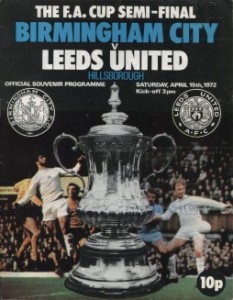Friday 27 January 2012 (07.00 am)
Watford v Tottenham Hotspur (7.45 pm)
Everton v Fulham (8.00 pm)
 When the 2011/12 FA Cup Fourth Round begins on Friday night there will be two fixtures taking place. The first of these will see Watford take on Spurs at Vicarage Road. These two sides have met on four previous occasions in the FA Cup and Spurs have triumphed in all of them. Interestingly, the first two ever games between these clubs took place in the FA Cup. In January 1922 in the Second Round, Tottenham triumphed 1-0 at White Hart Lane and in 1939 an emphatic 7-1 win for Spurs in the Third Round. The most famous of the FA Cup meetings came in the 1986/87 season when the teams met in a Semi-Final tie at Villa Park. Tottenham finished comfortable 4-1 winners with Steve Hodge bagging a brace to add to goals from Clive Allen and Paul Allen. Malcolm Allen scored The Hornets goal. The last meeting between these team came in the Third Round in 1999 at Spurs, with the home side convincing 5-2 winners.
When the 2011/12 FA Cup Fourth Round begins on Friday night there will be two fixtures taking place. The first of these will see Watford take on Spurs at Vicarage Road. These two sides have met on four previous occasions in the FA Cup and Spurs have triumphed in all of them. Interestingly, the first two ever games between these clubs took place in the FA Cup. In January 1922 in the Second Round, Tottenham triumphed 1-0 at White Hart Lane and in 1939 an emphatic 7-1 win for Spurs in the Third Round. The most famous of the FA Cup meetings came in the 1986/87 season when the teams met in a Semi-Final tie at Villa Park. Tottenham finished comfortable 4-1 winners with Steve Hodge bagging a brace to add to goals from Clive Allen and Paul Allen. Malcolm Allen scored The Hornets goal. The last meeting between these team came in the Third Round in 1999 at Spurs, with the home side convincing 5-2 winners.
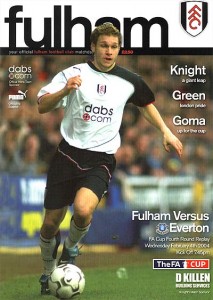 The other game will see Fulham travel to Goodison Park to take on Everton. For Fulham fans of a certain age this fixture will bring back memories of the Fifth Round tie that took place back in February 1975. A game which pitched then Second Division Fulham against the First Division leaders. It was to be an epic game that was part of an incredible 11 game journey by the men from Craven Cottage that took them to the 1975 FA Cup Final against West Ham United. Coincidentally, as was the case with Watford v Tottenham, the first two occasions Everton and Fulham met was also in the FA Cup. Everton first hosted Fulham in January 1926 in the Third Round. After a draw at Goodison, Fulham won the replay 1-0. It was over twenty years before these two clashed again, and on this occasion it was a Fifth Round tie in London in 1948. The game went to a replay and Fulham emerged 1-0 winners. In February 1975 and again at the Fifth Round stage, Fulham travelled to the North West and came away with a 2-1 victory courtesy of two Viv Busby goals. The last meeting was in the Fourth Round in 2004. The game at Goodison looked to be slipping away from Everton as they were behind 1-0 to a Sean Davis goal. However, in the dying minutes Francis Jeffers scored to ensure a replay. As in the first game Everton went behind and again Jeffers equalised in the dying minutes. However, Steed Malbranque was the Fulham hero as he scored to sent The Cottagers through 2-1.
The other game will see Fulham travel to Goodison Park to take on Everton. For Fulham fans of a certain age this fixture will bring back memories of the Fifth Round tie that took place back in February 1975. A game which pitched then Second Division Fulham against the First Division leaders. It was to be an epic game that was part of an incredible 11 game journey by the men from Craven Cottage that took them to the 1975 FA Cup Final against West Ham United. Coincidentally, as was the case with Watford v Tottenham, the first two occasions Everton and Fulham met was also in the FA Cup. Everton first hosted Fulham in January 1926 in the Third Round. After a draw at Goodison, Fulham won the replay 1-0. It was over twenty years before these two clashed again, and on this occasion it was a Fifth Round tie in London in 1948. The game went to a replay and Fulham emerged 1-0 winners. In February 1975 and again at the Fifth Round stage, Fulham travelled to the North West and came away with a 2-1 victory courtesy of two Viv Busby goals. The last meeting was in the Fourth Round in 2004. The game at Goodison looked to be slipping away from Everton as they were behind 1-0 to a Sean Davis goal. However, in the dying minutes Francis Jeffers scored to ensure a replay. As in the first game Everton went behind and again Jeffers equalised in the dying minutes. However, Steed Malbranque was the Fulham hero as he scored to sent The Cottagers through 2-1.
Tonight then, two games where FA Cup history says that the winners will be Tottenham and Fulham. If only it were that simple.
Friday 27 January 2012 (11.00 pm)
Watford (0) – (1) Tottenham Hotspur
Everton (2) – (1) Fulham
Abba famously sang in their hit “Waterloo”, “…The history book on the shelf, Is always repeating itself…” Now, fine exponents of the pop song they may have been, but as for football pundits, well, the jury has to be out tonight. History said Tottenham hadn’t lost to Watford in the Cup and so it continued as Spurs came away from Vicarage Road with a 1-0 win. Rafael van der Vaart’s long range effort just before half-time gave Spurs the lead, but The Hornets provided their Premier League opponents with a real test in the second period. After the game Spurs manager Harry Redknapp acknowledged that his team had indeed ridden their luck to make it through to the Fifth Round. Unfortunately for Watford it was a case of “So Long” to this years competition.
Meanwhile on Merseyside, Fulham were at Goodison with their unbeaten FA Cup record over Everton at stake. It all looked good for The Cottagers when they went ahead through a Danny Murphy penalty. However, The Toffees worked their way back into the game and were level before the half-hour mark. Everton emerged the better side in the second-half and a header from Marouane Fellaini ensured their progress and Fulham’s exit.
“Hasta Manana”
Saturday 28 January 2012 (10:00 am)
Sheffield United v Birmingham City
It’s a case of back to Bramall Lane for the ‘trail’ game later today. January has been a mixed month in the League for The Blades, with two convincing wins, against Yeovil and Bury, offset by two losses to Carlisle United and last weekend at League leaders Charlton. Birmingham have gone unbeaten this month, drawing with Peterborough (1-1), followed by wins against Ipswich (2-1), Millwall (6-0) and Watford (3-0). Both clubs have to date had good seasons and they both occupy a play-off place in their respective divisions.
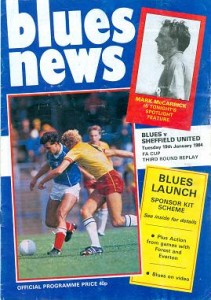 In terms of the FA Cup, this will be The Blades fourth tie this season and in the last round Sheffield United put an end to non-league Salisbury City’s adventure 3-1, whilst Birmingham put out Midlands rivals 1-0 in a replay at Molineux. These clubs have met previously in the FA Cup on three occasions and on each occasion Birmingham City have emerged as winners. The Blues won 2-1 in 1933/34, 3-1 after a replay in 1952/53, with the most recent tie in the 1983/84 season. In a Third Round tie at Bramall Lane, then Third Division Sheffield United held First Division Birmingham City to a 1-1 draw, before The Blues emerged 2-0 winners in the replay.
In terms of the FA Cup, this will be The Blades fourth tie this season and in the last round Sheffield United put an end to non-league Salisbury City’s adventure 3-1, whilst Birmingham put out Midlands rivals 1-0 in a replay at Molineux. These clubs have met previously in the FA Cup on three occasions and on each occasion Birmingham City have emerged as winners. The Blues won 2-1 in 1933/34, 3-1 after a replay in 1952/53, with the most recent tie in the 1983/84 season. In a Third Round tie at Bramall Lane, then Third Division Sheffield United held First Division Birmingham City to a 1-1 draw, before The Blues emerged 2-0 winners in the replay.
This is The Blades toughest test in the Cup this season and will be a good chance to compare themselves against Championship opposition.
Saturday 28 January 2012 (07:00 pm)
Sheffield United (0) – (4) Birmingham City
 The Blades FA Cup run came to an emphatic end at the hands of Birmingham City today. To an extent the score-line doesn’t reflect the part United played in this game, although they did at times contribute to their own downfall today. The Blades opened the game very positively and dominated the opening fifteen minutes. Ched Evans, Lee Williamson and Stephen Quinn were causing problems for Birmingham and with over 18,000 in the ground their was a terrific atmosphere inside Bramall Lane. However, with their first corner of the game, Nathan Redmond was picked out and his shot flashed into the net to give The Blues a lead against the run of play. Birmingham suddenly looked a different side, who seemed first to every loose ball and eager for more goals. The Blades were now playing far deeper and allowed The Blues space in midfield. On a couple of occasions Redmond drove at the United defence, but shot wastefully wide. Chris Burke too was coming more into the game and getting dangerously down the flanks. On 38 minutes Burke was involved in getting wide again and his cross was efficiently swept past Simonsen by Adam Rooney to put City 2-0 up, as they cruised towards half-time.
The Blades FA Cup run came to an emphatic end at the hands of Birmingham City today. To an extent the score-line doesn’t reflect the part United played in this game, although they did at times contribute to their own downfall today. The Blades opened the game very positively and dominated the opening fifteen minutes. Ched Evans, Lee Williamson and Stephen Quinn were causing problems for Birmingham and with over 18,000 in the ground their was a terrific atmosphere inside Bramall Lane. However, with their first corner of the game, Nathan Redmond was picked out and his shot flashed into the net to give The Blues a lead against the run of play. Birmingham suddenly looked a different side, who seemed first to every loose ball and eager for more goals. The Blades were now playing far deeper and allowed The Blues space in midfield. On a couple of occasions Redmond drove at the United defence, but shot wastefully wide. Chris Burke too was coming more into the game and getting dangerously down the flanks. On 38 minutes Burke was involved in getting wide again and his cross was efficiently swept past Simonsen by Adam Rooney to put City 2-0 up, as they cruised towards half-time.
The Blades were first out the blocks in the second-half and dominated the opening ten minutes. Lee Williamson was again a threat to Birmingham as was the experienced Richard Cresswell with a couple of attempts on goal. However, Birmingham weathered the storm, and scored a third on 58 minutes. As they had done in the opening period The Blades backed off and backed off and Wade Elliot took advantage by firing home to put City 3-0 up and send the 4,000 travelling fans delirious. United continued to press, but could find no way past the City custodian Colin Doyle who was to keep a clean-sheet, despite some nervous looking handling all afternoon. With less than fifteen minutes remaining, a period of sustained Birmingham possession saw the ball switched into the six-yard box, where Adam Rooney tucked home his second and a fourth goal for The Blues. As some Blades fans drifted away at the last goal, so the match lost its earlier intensity and after 3 minutes of time added-on the referee blew for time.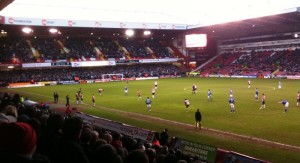
On reflection, United will know they had their periods of pressure, but Birmingham were clinical and scored at crucial times. The Blades were somewhat unfortunate to play Birmingham at this point, as the side from St Andrews are running into a bit of form latterly. Danny Wilson will not have the Cup as a distraction now and instead must look to focus his side and ensure they are ready to battle for promotion. City will look forward to the next round and keep their own chances of promotion on the boil.
I’d like to put on record my thanks to Sheffield United as a club for their pricing policy throughout the FA Cup this year. The total cost for the four games I have seen at Bramall Lane has only been £45 and it has been a privilege to have witnessed the four game adventure. Good luck to The Blades in their promotion push.
Sunday 29 January 2012 (7.00 pm)
Sunderland (1) – (1) Middlesbrough
In the first of the two final games of the Fourth Round, the Wear-Tees derby took place at The Stadium of Light in front of a crowd of over 33,000. It proved to be a no-nonsense game that you would expect from such close Northeast neighbours. The visitors struck first when on 16 minutes, Barry Robson brilliantly gave Boro’ the lead. However, hero turned villain, when Robson gave away possession which lead to a goal for substitute Fraizer Campbell who made a goal-scoring return after 18 months out injured.
Arsenal (3) – (2) Aston Villa
At half-time this game seemed only to be going one way and that was a Cup exit for Arsenal. Villa had gone ahead through Richard Dunne on 33 minutes and were seemingly cruising at 2-0 when Darren Bent scored on the stroke of half-time. However, the game all turned in a frantic seven minute spell. On 54 minutes Aaron Ramsey was brought down by goal-scorer Dunne and from the resulting penalty Robin van Persie gave The Gunners a way back into the game. Three minutes later and the game was all square when Theo Walcott was credited with a scrappy looking goal, not that the Emirates faithful cared. The comeback was complete on 61 minutes, this time the other Villa scorer, Bent conceded the penalty, and Captain Fantastic did the rest from the spot. They always say you need a bit of luck to win the Cup. Arsenal will certainly hope so.

In the remaining “trail” game not covered so far, Bolton Wanderers made it through to the Fifth Round after a 2-1 home win over Swansea City. Luke Moore put the visitors ahead on 43 minutes, but The Swans couldn’t hang on to their lead until the half-time whistle. In time added-on, Darren Pratley headed in from a Martin Petrov free-kick. The game was won on 56 minutes when Gerhard Tremmel, the Swansea reserve keeper couldn’t hold a Petrov shot and Chris Eagles gleefully slotted home the loose ball.
After the draw the Fifth Round “trail” fixtures are as follows:
Everton v Blackpool/Sheffield Wednesday
Chelsea v Birmingham City
Sunderland/Middlesbrough v Arsenal/Aston Villa
Millwall/Southampton v Bolton Wanderers
So Wembley is a step closer and as those football pundits from Abba once said, “…the winner takes it all, the loser has to fall…”
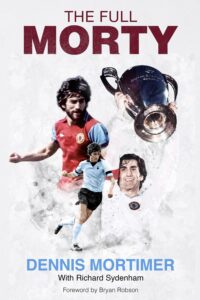 The gripping memoir and tell-all biography of Dennis Mortimer, including his decade at Villa and the team’s European Cup win.
The gripping memoir and tell-all biography of Dennis Mortimer, including his decade at Villa and the team’s European Cup win. Compelling, entertaining and refreshingly honest, One in a Million is the autobiography of Trevor Francis, the subject of the first £1 million transfer fee in football history – a record for all time.
Compelling, entertaining and refreshingly honest, One in a Million is the autobiography of Trevor Francis, the subject of the first £1 million transfer fee in football history – a record for all time. For me, a great autobiography gives a reader a really authentic, honest insight into the individual and helps them understand that person more. When the subject of the autobiography is particularly complex and nuanced and someone you haven’t necessarily been able to connect with or relate to before, yet you come away from the book with recognition and perspective, that’s all the more telling of a successful autobiography, and in that respect Troy Deeney’s Redemption excels. Deeney is one of those players that is perhaps largely misunderstood, divisive and dismissed for those without a Watford affiliation and, certainly, I would be guilty of being drawn into this narrative, so I was really intrigued to read this book and came away from it with genuine renewed understanding for Deeney.
For me, a great autobiography gives a reader a really authentic, honest insight into the individual and helps them understand that person more. When the subject of the autobiography is particularly complex and nuanced and someone you haven’t necessarily been able to connect with or relate to before, yet you come away from the book with recognition and perspective, that’s all the more telling of a successful autobiography, and in that respect Troy Deeney’s Redemption excels. Deeney is one of those players that is perhaps largely misunderstood, divisive and dismissed for those without a Watford affiliation and, certainly, I would be guilty of being drawn into this narrative, so I was really intrigued to read this book and came away from it with genuine renewed understanding for Deeney. Nicklas Bendtner is perhaps not a major name in Premier League history and certainly not the icon he dreamt, even predicted, he’d become as a young boy head and shoulders above his compatriots in his homeland of Denmark. More of a cult figure, and a problematic one at that, even for Arsenal fans, where he spent the majority of his career, though Bendtner’s name may not be amongst football’s Hollywood elite, his life story is definitely one more suited to the big screen as his autobiography Both Sides makes explicit. Indeed, his early prowess and his move to boyhood club Arsenal which promised much, followed by his larger-than-life antics and headline-making behaviour off the pitch reads like a quintessential Hollywood story of an outsider’s rags-to-riches ascent and eventual fall from grace, with so many outrageous episodes you’d be forgiven for thinking this was a movie script.
Nicklas Bendtner is perhaps not a major name in Premier League history and certainly not the icon he dreamt, even predicted, he’d become as a young boy head and shoulders above his compatriots in his homeland of Denmark. More of a cult figure, and a problematic one at that, even for Arsenal fans, where he spent the majority of his career, though Bendtner’s name may not be amongst football’s Hollywood elite, his life story is definitely one more suited to the big screen as his autobiography Both Sides makes explicit. Indeed, his early prowess and his move to boyhood club Arsenal which promised much, followed by his larger-than-life antics and headline-making behaviour off the pitch reads like a quintessential Hollywood story of an outsider’s rags-to-riches ascent and eventual fall from grace, with so many outrageous episodes you’d be forgiven for thinking this was a movie script.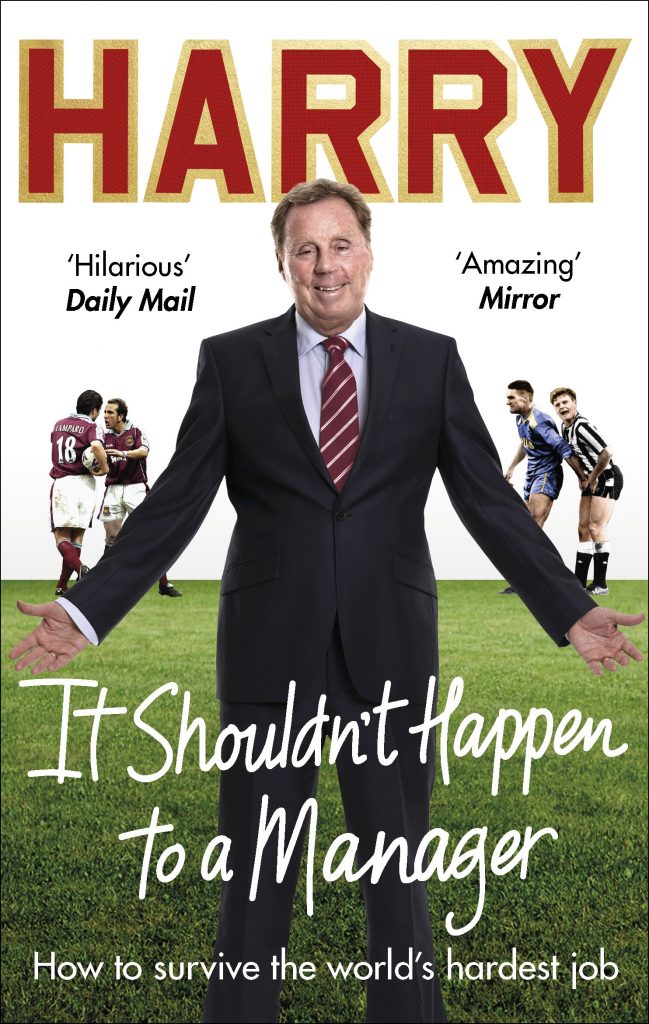
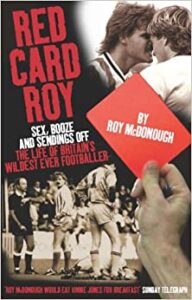
 When the 2011/12 FA Cup Fourth Round begins on Friday night there will be two fixtures taking place. The first of these will see Watford take on Spurs at Vicarage Road. These two sides have met on four previous occasions in the FA Cup and Spurs have triumphed in all of them. Interestingly, the first two ever games between these clubs took place in the FA Cup. In January 1922 in the Second Round, Tottenham triumphed 1-0 at White Hart Lane and in 1939 an emphatic 7-1 win for Spurs in the Third Round. The most famous of the FA Cup meetings came in the 1986/87 season when the teams met in a Semi-Final tie at Villa Park. Tottenham finished comfortable 4-1 winners with Steve Hodge bagging a brace to add to goals from Clive Allen and Paul Allen. Malcolm Allen scored The Hornets goal. The last meeting between these team came in the Third Round in 1999 at Spurs, with the home side convincing 5-2 winners.
When the 2011/12 FA Cup Fourth Round begins on Friday night there will be two fixtures taking place. The first of these will see Watford take on Spurs at Vicarage Road. These two sides have met on four previous occasions in the FA Cup and Spurs have triumphed in all of them. Interestingly, the first two ever games between these clubs took place in the FA Cup. In January 1922 in the Second Round, Tottenham triumphed 1-0 at White Hart Lane and in 1939 an emphatic 7-1 win for Spurs in the Third Round. The most famous of the FA Cup meetings came in the 1986/87 season when the teams met in a Semi-Final tie at Villa Park. Tottenham finished comfortable 4-1 winners with Steve Hodge bagging a brace to add to goals from Clive Allen and Paul Allen. Malcolm Allen scored The Hornets goal. The last meeting between these team came in the Third Round in 1999 at Spurs, with the home side convincing 5-2 winners. The other game will see Fulham travel to Goodison Park to take on Everton. For Fulham fans of a certain age this fixture will bring back memories of the Fifth Round tie that took place back in February 1975. A game which pitched then Second Division Fulham against the First Division leaders. It was to be an epic game that was part of an incredible 11 game journey by the men from Craven Cottage that took them to the 1975 FA Cup Final against West Ham United. Coincidentally, as was the case with Watford v Tottenham, the first two occasions Everton and Fulham met was also in the FA Cup. Everton first hosted Fulham in January 1926 in the Third Round. After a draw at Goodison, Fulham won the replay 1-0. It was over twenty years before these two clashed again, and on this occasion it was a Fifth Round tie in London in 1948. The game went to a replay and Fulham emerged 1-0 winners. In February 1975 and again at the Fifth Round stage, Fulham travelled to the North West and came away with a 2-1 victory courtesy of two Viv Busby goals. The last meeting was in the Fourth Round in 2004. The game at Goodison looked to be slipping away from Everton as they were behind 1-0 to a Sean Davis goal. However, in the dying minutes Francis Jeffers scored to ensure a replay. As in the first game Everton went behind and again Jeffers equalised in the dying minutes. However, Steed Malbranque was the Fulham hero as he scored to sent The Cottagers through 2-1.
The other game will see Fulham travel to Goodison Park to take on Everton. For Fulham fans of a certain age this fixture will bring back memories of the Fifth Round tie that took place back in February 1975. A game which pitched then Second Division Fulham against the First Division leaders. It was to be an epic game that was part of an incredible 11 game journey by the men from Craven Cottage that took them to the 1975 FA Cup Final against West Ham United. Coincidentally, as was the case with Watford v Tottenham, the first two occasions Everton and Fulham met was also in the FA Cup. Everton first hosted Fulham in January 1926 in the Third Round. After a draw at Goodison, Fulham won the replay 1-0. It was over twenty years before these two clashed again, and on this occasion it was a Fifth Round tie in London in 1948. The game went to a replay and Fulham emerged 1-0 winners. In February 1975 and again at the Fifth Round stage, Fulham travelled to the North West and came away with a 2-1 victory courtesy of two Viv Busby goals. The last meeting was in the Fourth Round in 2004. The game at Goodison looked to be slipping away from Everton as they were behind 1-0 to a Sean Davis goal. However, in the dying minutes Francis Jeffers scored to ensure a replay. As in the first game Everton went behind and again Jeffers equalised in the dying minutes. However, Steed Malbranque was the Fulham hero as he scored to sent The Cottagers through 2-1.
 In terms of the FA Cup, this will be The Blades fourth tie this season and in the last round Sheffield United put an end to non-league Salisbury City’s adventure 3-1, whilst Birmingham put out Midlands rivals 1-0 in a replay at Molineux. These clubs have met previously in the FA Cup on three occasions and on each occasion Birmingham City have emerged as winners. The Blues won 2-1 in 1933/34, 3-1 after a replay in 1952/53, with the most recent tie in the 1983/84 season. In a Third Round tie at Bramall Lane, then Third Division Sheffield United held First Division Birmingham City to a 1-1 draw, before The Blues emerged 2-0 winners in the replay.
In terms of the FA Cup, this will be The Blades fourth tie this season and in the last round Sheffield United put an end to non-league Salisbury City’s adventure 3-1, whilst Birmingham put out Midlands rivals 1-0 in a replay at Molineux. These clubs have met previously in the FA Cup on three occasions and on each occasion Birmingham City have emerged as winners. The Blues won 2-1 in 1933/34, 3-1 after a replay in 1952/53, with the most recent tie in the 1983/84 season. In a Third Round tie at Bramall Lane, then Third Division Sheffield United held First Division Birmingham City to a 1-1 draw, before The Blues emerged 2-0 winners in the replay. The Blades FA Cup run came to an emphatic end at the hands of Birmingham City today. To an extent the score-line doesn’t reflect the part United played in this game, although they did at times contribute to their own downfall today. The Blades opened the game very positively and dominated the opening fifteen minutes. Ched Evans, Lee Williamson and Stephen Quinn were causing problems for Birmingham and with over 18,000 in the ground their was a terrific atmosphere inside Bramall Lane. However, with their first corner of the game, Nathan Redmond was picked out and his shot flashed into the net to give The Blues a lead against the run of play. Birmingham suddenly looked a different side, who seemed first to every loose ball and eager for more goals. The Blades were now playing far deeper and allowed The Blues space in midfield. On a couple of occasions Redmond drove at the United defence, but shot wastefully wide. Chris Burke too was coming more into the game and getting dangerously down the flanks. On 38 minutes Burke was involved in getting wide again and his cross was efficiently swept past Simonsen by Adam Rooney to put City 2-0 up, as they cruised towards half-time.
The Blades FA Cup run came to an emphatic end at the hands of Birmingham City today. To an extent the score-line doesn’t reflect the part United played in this game, although they did at times contribute to their own downfall today. The Blades opened the game very positively and dominated the opening fifteen minutes. Ched Evans, Lee Williamson and Stephen Quinn were causing problems for Birmingham and with over 18,000 in the ground their was a terrific atmosphere inside Bramall Lane. However, with their first corner of the game, Nathan Redmond was picked out and his shot flashed into the net to give The Blues a lead against the run of play. Birmingham suddenly looked a different side, who seemed first to every loose ball and eager for more goals. The Blades were now playing far deeper and allowed The Blues space in midfield. On a couple of occasions Redmond drove at the United defence, but shot wastefully wide. Chris Burke too was coming more into the game and getting dangerously down the flanks. On 38 minutes Burke was involved in getting wide again and his cross was efficiently swept past Simonsen by Adam Rooney to put City 2-0 up, as they cruised towards half-time.

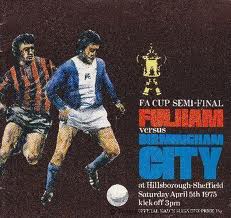
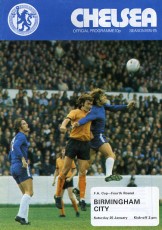 My match day experience is not complete unless I am able to get a programme. Over the years there have been just four games when this has happened. Thanks to the Internet the ability to try and get hold of those missing programmes has become easier. Just this week I managed to track down one of the missing four. The game in question was an FA Cup 4th Round game between Chelsea and Birmingham City at Stamford Bridge in 1975. One of the things about programmes for me is the memories that they evoke, in the same way songs, smells or photographs do for other people. They are in their own way a piece of social history. But it is also for me about being there, the shared experience and a confirming of your existence.
My match day experience is not complete unless I am able to get a programme. Over the years there have been just four games when this has happened. Thanks to the Internet the ability to try and get hold of those missing programmes has become easier. Just this week I managed to track down one of the missing four. The game in question was an FA Cup 4th Round game between Chelsea and Birmingham City at Stamford Bridge in 1975. One of the things about programmes for me is the memories that they evoke, in the same way songs, smells or photographs do for other people. They are in their own way a piece of social history. But it is also for me about being there, the shared experience and a confirming of your existence.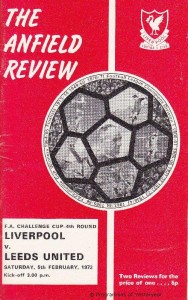 “On what grounds are you applying to read English at Liverpool of all places?” my mystified English teacher asked me. How could I tell him the grounds were Anfield and Goodison Park?
“On what grounds are you applying to read English at Liverpool of all places?” my mystified English teacher asked me. How could I tell him the grounds were Anfield and Goodison Park?